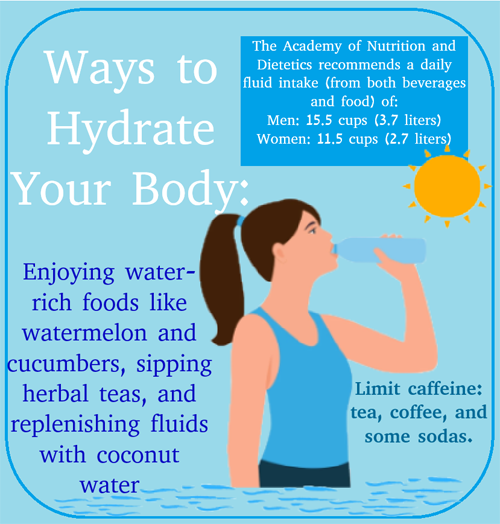Are You Hydrating Enough? Why Water Is More Important Than You Think
Water is essential for life, supporting almost every function in the body. Even slight dehydration can trigger confusion, irritability, dizziness, muscle cramps, and headaches before the problem becomes apparent.
Dehydration is more than just uncomfortable—it can be dangerous. In the United States, it accounts for an estimated 1% to 3% of all hospital admissions, with rates even higher in some tropical regions. If untreated, it can cause serious complications, particularly in older adults and individuals with certain medical conditions.

Why Hydration Matters So Much
Water is a key player in maintaining overall health:
-
✅ Brain function: Helps you stay alert, think clearly, and maintain focus.
-
✅ Nutrient delivery: Carries vitamins, minerals, and oxygen to your cells.
-
✅ Waste removal: Flushes out toxins through urine, sweat, and bowel movements.
-
✅ Joint lubrication: Keeps your joints moving smoothly.
-
✅ Temperature regulation: Prevents overheating during activity or in hot weather.
-
✅ Physical performance: Reduces fatigue and supports endurance.
When you lose more fluids than you take in — whether from sweating, illness, or simply forgetting to drink — the body’s systems begin to strain.
How Much Is Enough?
The Academy of Nutrition and Dietetics recommends a daily fluid intake (from both beverages and food) of:
- Men: 124 ounces / 15.5 cups (3.7 liters)
- Women: 92 ounces / 11.5 cups (2.7 liters)
However, these figures are not fixed—you might require more based on:
- Physical activity level
- Outdoor temperature and humidity
- Illness or fever
- Pregnancy or breastfeeding
Recognizing the Signs of Dehydration
Dehydration affects you physically, mentally, and emotionally. Blood vessels constrict, reducing circulation and making your body work harder. Symptoms can include:
- Fatigue and weakness
- Dizziness or loss of coordination
- Dry mouth or persistent cough
- Headache
- Muscle cramps from lost electrolytes
- Heat intolerance or chills
- Flushed skin
Hydration from Food: Nature’s Water-Packed Snacks
Water isn’t only found in your glass—it’s also on your plate. Many fruits and vegetables are rich in water, making it easier to meet your daily hydration needs.
Examples include:
✅ Cucumbers: Cucumbers are over 96% water. They also contain antioxidants and vitamin K for strong bones.
✅ Celery: Celery is about 95% water and provides magnesium, potassium, and other nutrients.
✅ Green Leafy Vegetables: Iceberg lettuce is 96% water, while kale/a> and spinach have over 90% water.
✅ Tomatoes: Tomatoes are about 95% water and rich in lycopene, which may lower heart disease risk.
✅ Zucchini: Zucchini is nearly 95% water and contains antioxidants that support eye health.
✅ Watermelon: Watermelon is 92% water and full of nutrients like lycopene, for immune, skin, and gut health.
✅ Cauliflower: Cauliflower is 92% water and high in vitamins C and K, with possible cancer-protective effects.
✅ Bell Peppers: Bell peppers are over 92% water and packed with vitamins and minerals.
✅ Asparagus: Asparagus is 92% water and may help the body recover from dehydration.
✅ Strawberries: Strawberries have over 90% water and are rich in vitamin C and antioxidants.
✅ Cantaloupe (90% water) and oranges (86% water) are refreshing, thirst-quenching fruits to enjoy.
Also, soups, and coconut water can boost hydration while keeping meals interesting.
Stay Hydrated All Day
-
Make water interesting: Enhance flavor naturally with lemon slices, cucumber, berries, or fresh herbs like mint—no added sugar needed.
-
Limit caffeine: Tea, coffee, and certain sodas aren’t primary hydration sources and have a mild diuretic effect, so enjoy them in moderation.
-
Keep water nearby: Carry a reusable bottle, mug, or tumbler to encourage regular sipping.
-
Plan ahead for hot days: Boost fluid intake before and during hot weather, workouts, or extended outdoor activities.
-
Know your body’s needs: If you have medical conditions like heart failure or kidney issues, check with your healthcare provider for personalized hydration guidance.
Make Hydration a Habit
Avoiding dehydration is as simple as making sure you drink enough. The risk of dehydration increases with age, partly because your thirst sensation may weaken over time. That means you can’t always rely on “feeling thirsty” to know when to drink.
So, don’t wait until you’re parched — drink regularly, eat water-rich foods, and listen to your body. Staying hydrated supports every cell, every organ, and every system in your body.
Bottom line: Drink up — your health depends on it. Medical Disclaimer.
Read further on:
≺≺ What Is the Ketogenic Diet? Is the Keto Diet Right for Everyone?
≺≺ What is the Okinawan diet? What is the secret behind Okinawan long life expectancy?
≺≺ What are the four enemies of blood sugar?
≺≺ EWG’s- The Clean Fifteen: Fruits and Vegetables with the Lowest Pesticide Levels.
≺≺ What are antioxidants? How antioxidants in the fruits and vegetables help in preventing cancers and diseases?
≺≺ What foods should people with high blood pressure avoid?
≺≺ How can I reduce the risk of cancer-causing chemicals when cooking or grilling meat?
≺≺ How toxic are the nitrites used in curing processed meats?
≺≺ How are artificial sweeteners made?
≺≺ What health problems are linked to consuming corn syrup?
≺≺ What happens to my blood vessels when I gain weight?
≺≺ What type of exercise is best for lowering my blood sugar?
≺≺ What impact can sitting for long periods have on my health?
≺≺ Does my social circle impact my weight?
≺≺ How toxic are the nitrites used in curing processed meats?
≺≺ What foods can lower prostate cancer risk?
≻≻ Watch this page for more such informative articles on Health, Nutrition, and Wellness.
≻≻-Back to Home page.
Further reading (External Links opens in new window):
≺≺- The Johns Hopkins University- Dehydration.
≺≺- Harvard Health Publishing- How much water should you drink?

